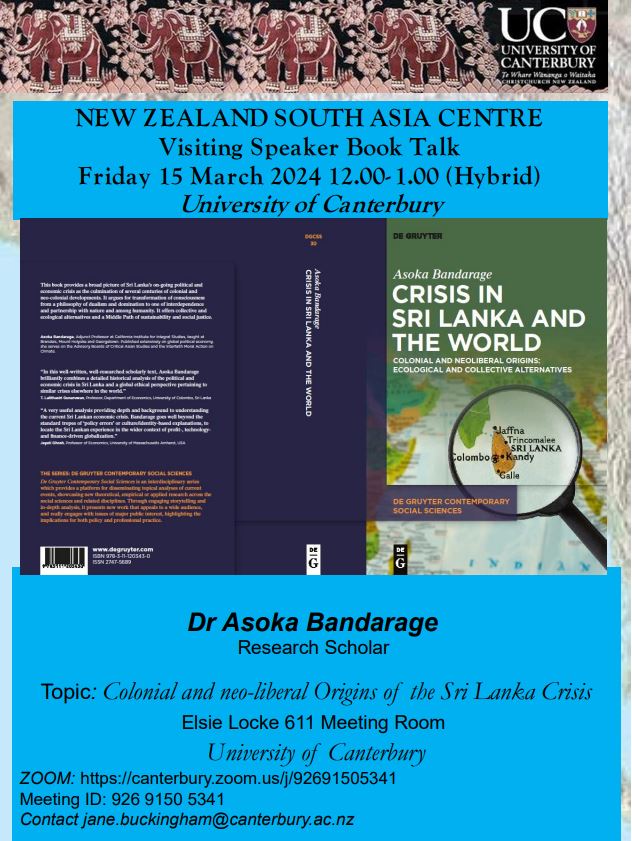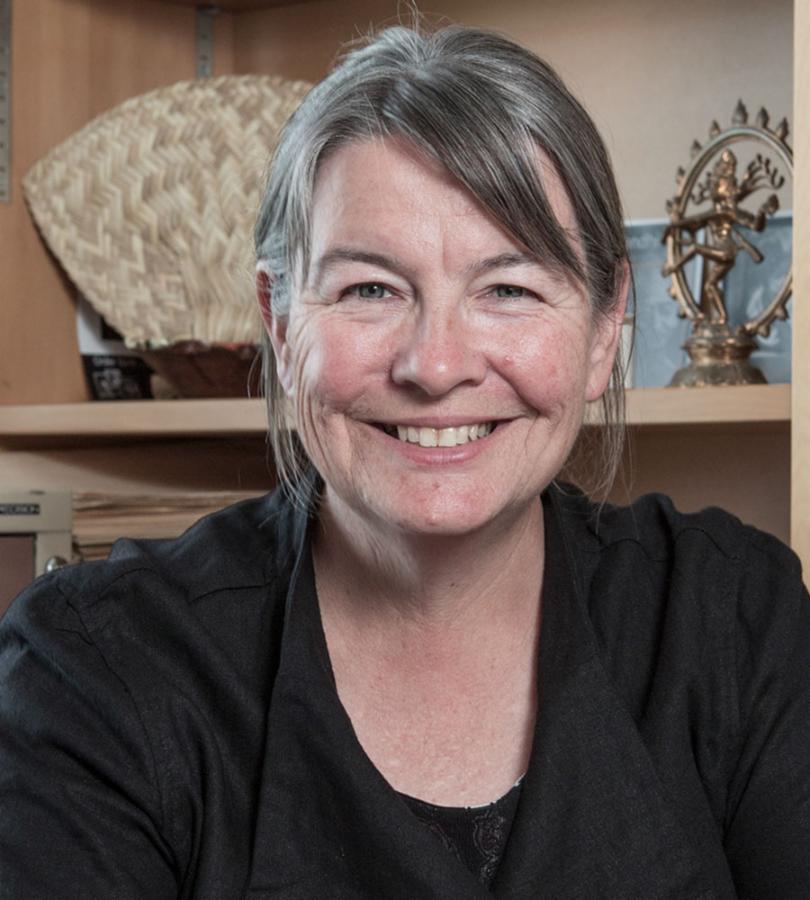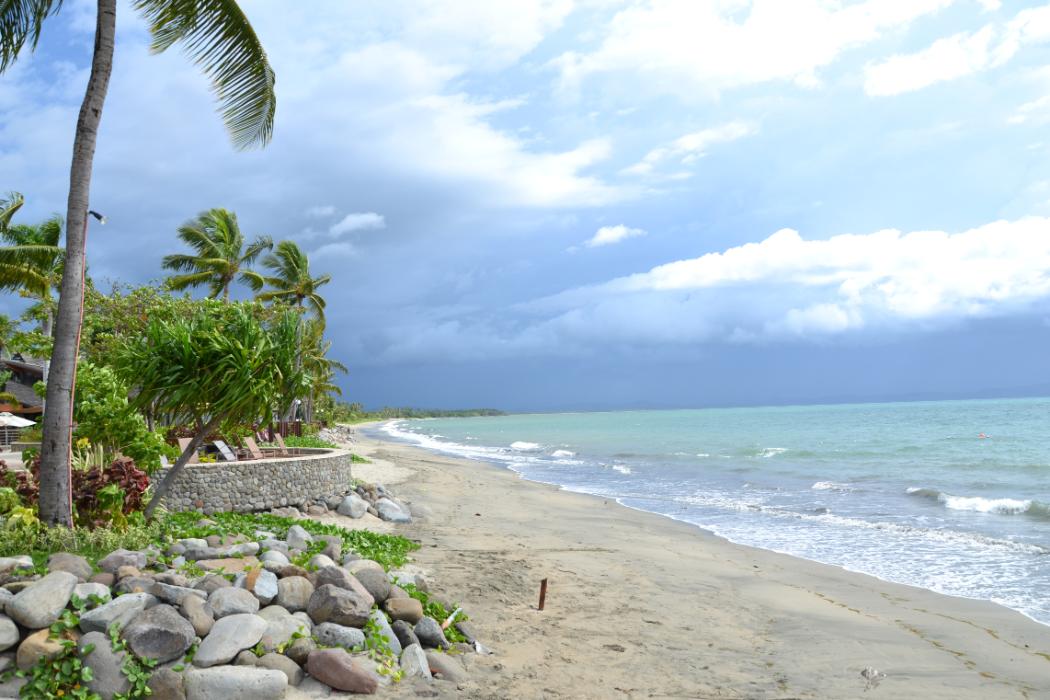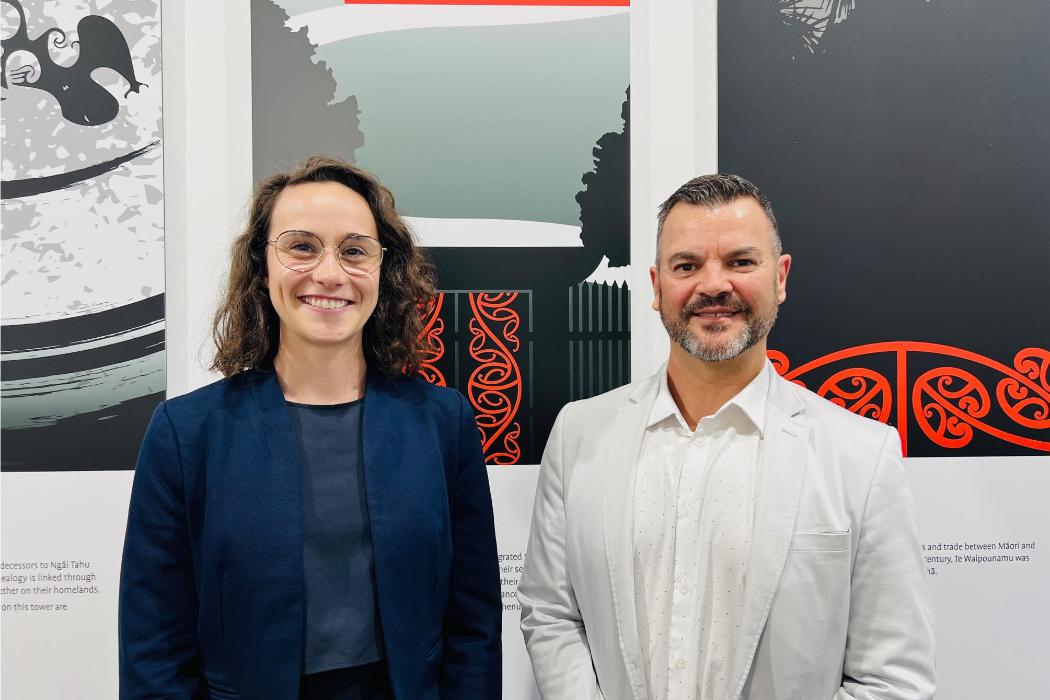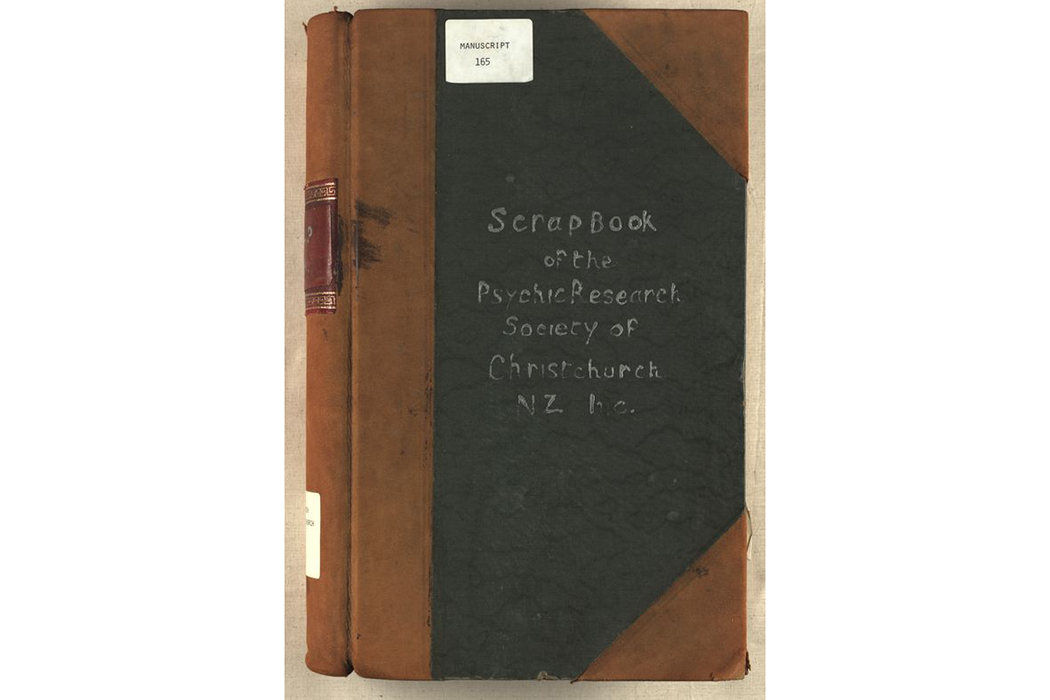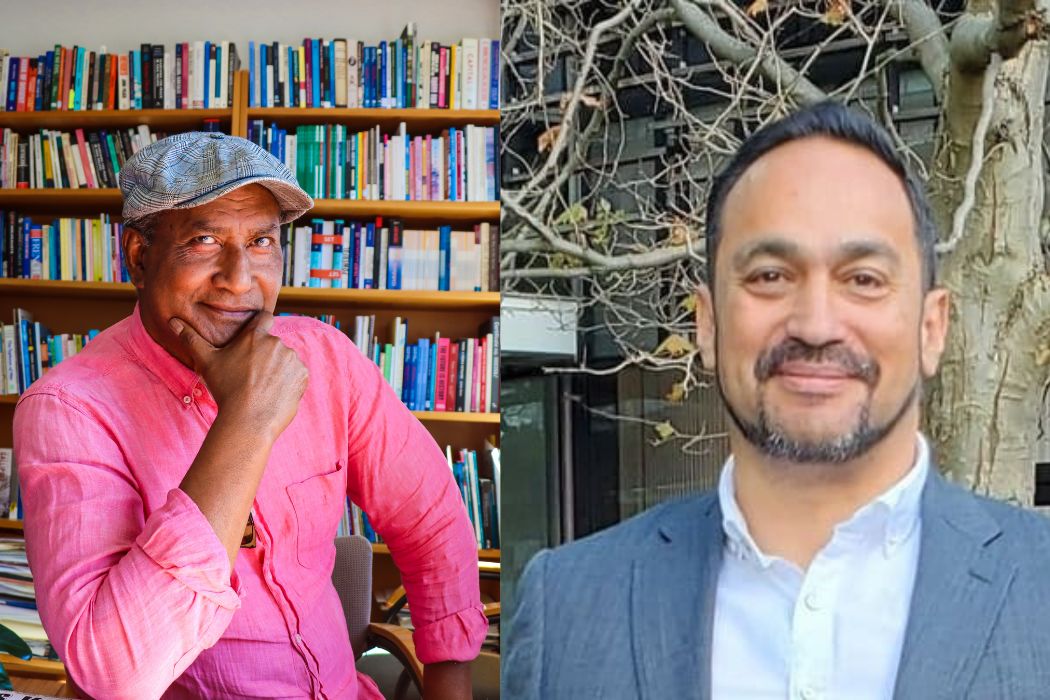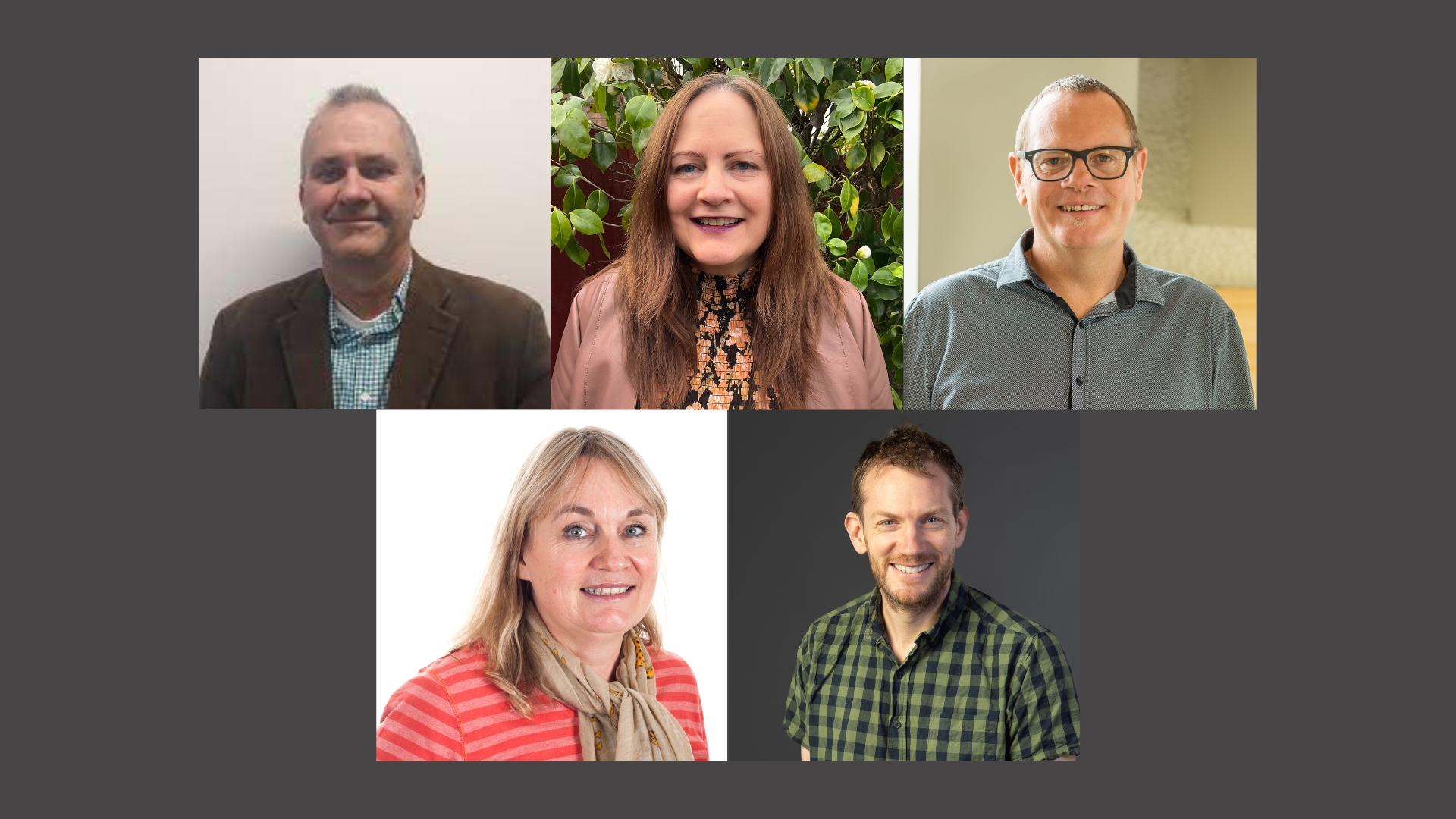How to become an Associate?
Associate membership of NZSAC is available to post-graduate students and other scholars conducting South Asia related research. Associate members must either be members of NZ academic institutions or linked to scholars of South Asia based in New Zealand. If you are interested to become an associate member please fill in the New Zealand South Asia Centre Associate Member Application Form.
Members
Arindam Basu
Dr Arindam Basu is a physician, an epidemiologist, and works as a senior lecturer at the Health Sciences Centre of the Univesity of Canterbury. Additionally, he also serves as the Senior Researcher of the Health Services Assessment Collaboration, a research unit of the Health Sciences Centre. Arindam's research interests in South Asia & New Zealand include health effects and epidemiology of inorganic Arsenic exposure that has occurred in South Asia over the last four decades preceding the turn of the century; he is also interested in general in Environmental epidemiology, health policy, and migrant health related issues connecting South Asia and Australasia.
Jane Buckingham (Director)
Jane is a specialist in South Asian History, particularly the history of South India. Her research interests are principally in the areas of law, welfare and philanthropy and the history of medicine and health. Jane's research into colonial medical history has included archival and hospital experience and she has travelled extensively throughout India. Jane's current research project focuses on government and philanthropy in early colonial Madras.
Ritodhi Chakraborty
Ritodhi's research and teaching focus on critical, radical, and feminist studies of nature-society relationships in the Asia/Pacific and on rural/migrant masculinity in the Himalaya. His research centres topics that resonate with concerns of social and environmental justice, especially as they manifest through relationships between young people and indigenous/rural communities and the land. His theoretical interests include critical environmental justice, critical/feminist studies of global environmental change, science and technology studies, and critical development studies, youth studies from the majority world and feminist studies of migration. His current research project explores the functional and emancipatory value of indigenous cartography in landscape redesign within Aotearoa and the politics of climate adaptation across the Himalaya. He is most interested in challenging climate reductive translations which erase historical processes of subjugation such as colonization, imperialism and patriarchy. He actively pursues research that is boundary-crossing between natural and social sciences and knowledge co-production with indigenous and local communities.
Kuntal Das
Kuntal is a member of the Department of Economics and Finance. His main research interests are in international finance and development economics, focussing on developing and emerging market economies. His current research interests in South Asia include productivity differences and exchange rate movements in ASEAN and SAARC countries and understanding corporate governance and risk takings in Indian banks. Kuntal has been a consultant at the World Bank, and has held research positions at the International Monetary Fund, the Asian Development Bank and the National Institute of Public Finance and Policy in India.
Elaine Dobson
Elaine is a senior lecturer and postgraduate coordinator in the School of Music at the University of Canterbury. She is responsible for the introduction, teaching and development of the ethnomusicology courses, Himalayan Music and Asian Music. Her research into Tibetan and Bhutanese music, particularly that of the dranyen or Himalayan lute, has led to field work in Tibet, Bhutan and Nepal in 1991, 1998, 2004 and 2006, including visits to the remote areas of the eastern borders of Bhutan and the Humla region of north-west Nepal. In 2005, she undertook a preliminary, field study of the music of the Lepchas, the indigenous people of Sikkim (north India) and in 2006 was invited to be a member of the jury of the 2006 Bhutan Motion Picture Association Film Festival.
Baljit Kaur
Baljit was a faculty member in the School of Educational Studies and Human Development, College of Education. She has been a teacher educator for primary and early childhood teachers in India before joining the University of Canterbury. Her research interests are in the areas of historical and cultural studies of childhood and education with focus on home school relationships, literacy, disability, diversity and social justice. She has worked in Bastar, India, to investigate the relevance and substance of preschool education for tribal children, and studied the acquisition of reading and writing in five Indian languages. She is currently writing a book on the history of early childhood education in British India.
Piers Locke
Piers Locke formerly lectured in Anthropology in the School of Social and Political Sciences at University of Canterbury. His primary research concerns the history and ethnography of captive elephant management, and his main fieldwork is with the elephant handlers of the Chitwan National Park, Nepal. He has co-produced a documentary film and is currently writing a monograph about elephant handling practice in Nepal. He is also preparing further research projects on ethnoveterinary knowledge and on elephant handler life histories. Piers also has teaching interests in South Asian religion, culture and society.
Aditya Malik
Aditya is member of the Anthropology programme. His research icenters on the religious culture of Rajasthan and that of the Himalayan region of Kumaon using a combination of anthropological, textual and historical approaches. His interests cover oral traditions and ritual performance, pilgrimage, 'folk' Hinduism, multi-media and cultural studies, as well post-colonial and post-modern issues related to the study of Hinduism. His current research is focused on narratives and rituals of embodiment and notions of social justice with regard to Goludev, a widely worshipped folk deity from Kumaon.
Dorothy McMenamin
MA in history, specializes in modern South Asian history and religions. She has lectured on associated topics at the University of Canterbury, and is a freelance oral historian. Projects and publications include research on social life in Colonial India, religion and politics in Pakistan, migrants and refugees into New Zealand, and leprosy in the South Pacific region.
Clemency Montelle
Clemency is a member of the Mathematics and Statistics Department and researches in the History of Mathematics and Science in Ancient and Medieval India, particularly the transmission of ideas from other scientifically active societies in the ancient world. Of the estimated 30 million manuscripts that exist today, roughly as high as ten per cent of these are scientific. Clemency works with primary sources in Sanskrit, which she edits, translates, and writes scientific commentaries.
Venkatarama Nilakant
Venkatarama is a member of the Department of Management. His area of specialization is management of change. His research and writings relate to organizational changes in India after liberalization (post-1991). Currently he is working on a project which explores the management of change in the Indian Railways from 2004-2008.
Nadeera Ranabahu
Nadeera is a lecturer in entrepreneurship and innovation in the Department of Management, Marketing and Entrepreneurship in University of Canterbury. Nadeera's main research interests are in the areas of entrepreneurship, innovation and microfinance. She studies dynamic processes in entrepreneurial decision-making, innovation, learning, and development. In particular, she studies ways which entrepreneurs gain skills, make decisions, innovate, transform their ideas into products/services, establish systems, policies and procedures, and create entrepreneurial communities. Nadeera’s main research focus in South Asia is related to the use of microfinance services. She studies microfinance-related entrepreneurial practices, accountability issues in microfinance institutions (MFIs), innovative practices used by MFIs, and how women entrepreneurs use microfinance services for entrepreneurial purposes. Her main geographical focus is Sri Lanka.
Reshmi Roy
Reshmi taught within the New Zealand South Asia Centre and UC Opportunity, University of Canterbury. Her research interests include Postcolonial Studies, Cultural Studies, Cross-cultural management, Bollywood and Diasporic Cinema, Migrant and Gender issues. She has designed and taught courses dealing with Postcolonial Studies, Socio-cultural issues in post-independence India, Ethnic minorities in India, Indian Travel Writing, Women’s issues in India, Questions of Identity amongst the Indian Diaspora as well as courses on Indian "Parallel" cinema and worked as a research associate at Deakin University. She holds a Ph.D. in English and Cultural Studies and a Master of Arts, from University of Canterbury, New Zealand. She has a M.A. in English, a B.A. in English from University of Bombay, India and a Graduate Diploma in Journalism from Bombay.
Associates
Ali Ajmal
I am currently undertaking a mixed-method research project looking at the alcohol and psychoactive drug use patterns of 18-24 year old South Asian students at the University of Auckland. I plan to extend my study onto a PhD level research project in 2013 by using quantitative methods to chart the current alcohol and psychoactive drug use profile of the young New Zealand South Asian community.
Murad Ali
Murad is lecturer in the University of Malakand, Pakistan. At the moment, he is a doctoral candidate at the Institute of Development Studies, Massey University, New Zealand. His research interests include the nexus between international aid and development as well as democracy, human rights and nuclear proliferation. In particular, he is looking at the effectiveness of US bilateral aid to Pakistan in the framework of the 2005 Paris Declaration on Aid Effectiveness principles. His PhD study is funded through a scholarship by the government of Pakistan.
Rizwan Ali
Rizwan Ali is a doctoral scholar at the University of Auckland. His research interests are in the areas of disaster management with a focus on post-disaster recovery and reconstruction. He has conducted and presented case studies in Pakistan, Sri Lanka, and New Zealand. He worked as an Architect and Project Manager in the United Arab Emirates and Pakistan for eight years before moving to New Zealand in 2018. He holds MSc in Construction and Project Management with extensive experience in design and construction. He has a keen interest in writing and publishing articles on various platforms in areas of community engagement, disaster recovery and reconstruction. He is also an Auckland Disaster Welfare Support Team member and Auckland Good and Ready volunteer for New Zealand Red Cross.
Rashmi Umesh Arora
Rashmi holds a PhD in Development Studies (University of Auckland) and MPhil in Applied Economics (JNU, Delhi). She was a postdoctoral research fellow at the Centre for Asia Pacific Social Transformation Studies (CAPSTRANS), University of Wollongong, Australia. She is a professional member of New Zealand Asian Studies Society and American Economic Association and also holds membership of ARC Asia Pacific Futures Research Network and Global Development Network. She has worked for about 20 years in India’s central bank in its economic policy department and was closely involved with India’s economic reforms. Her research areas geographically are Asia, South Asia, and India and topics of research interest are economic development, reforms, finance and development, less developed regions and globalisation. Among her major publications are Bank Credit and Economic Development: An Empirical Analysis of Indian States (Journal of Asian Public Policy, 2009), Gender Inequality, economic development and globalisation: A State level analysis of India (Journal of Developing Areas, forthcoming) and Bank Credit and Development - A Study of Uttar Pradesh, India, (VDM-Verlag).
Abdur Rehman Cheema
Mr. Abdur Rehman Cheema is associated with the Institute of Development Studies as a doctoral candidate. His research interests include: disaster risk reduction, disaster risk governance and role of religious community institutions in vulnerability reduction and sustainable development. He is looking at the role of religious institutions in achieving disaster risk reduction through improvement in disaster risk governance in the aftermath of the 2005 earthquake in Pakistan. His PhD study is funded through a scholarship by the government of Pakistan. Mr. Cheema had an opportunity to present his research to a range of audience and won a number of research grants. His recent publications are listed here and he can be contacted at a.r.cheema@massey.ac.nz
Jambugahapitiye Dhammaloka
Some of the recent publications of Jambugahapitiye Dhammaloka are The Candrārkī of Dinakara: A text related to solar and lunar tables, with Aditya Kolocana and et al, Journal for the History of Astronomy, Vol.49(3), 2018, A critical edition of the Candrārkī of Dinakara, with Aditya Kolocana and et al, History of Science in South Asia, Vol.6, 2018, and Computation of Sines in Nityānanda’s Sarvasiddhāntarāja, with K. Ramasubramanian, Clemency Montelle, Sources and Commentaries in the Exact Sciences, Vol. 17, SCIAMVS, Kyoto, 2016. The first two publications investigate into constructing calendars or almanacs (pañcāṅgas) as explained by Dinakara, a mathematical astronomer (16th cent. CE). The last is on the Nityānanda’s method of calculating the sine of 30 as enunciated in the Sarvasiddhāntarāja by Nityānanda (17th cent. CE).
Martin Fuchs
Martin is a Professor at the Advanced Cultural and Social Studies, Max-Weber-Kolleg of the University of Erfurt. He has taught anthropology and sociology at the University of Canterbury, universities of Zürich, Heidelberg and Paderborn, at Free University, Berlin, and Central European University, Budapest. His main interests include relationship of culture and praxis, interculturality and ethnographic representation, theories of modernity, social movements, anthropology and sociology of religion, the development of citizenship rights and urban anthropology. Regional focus: India. Fieldwork in a Bombay slum and in the Indian Himalayas.
Nisha Ghatak
Nisha is a Doctoral Scholar in Comparative Literature, School of European Languages & Literatures at the University of Auckland. Her doctoral research focuses on the study of Female Desire in Women’s Autobiographical Writing from 20th century India and New Zealand. Currently working as a Graduate Teaching Assistant and Research Assistant at the Faculty of Arts in the University of Auckland, Nisha’s research interests include gender studies, feminist theory, postcolonial theory and literature.
Antje Llinkenbach-Fuchs
Antje is a co-opted visiting Scientist at the College Research Unit. She taught anthropology and sociology at the University of Canterbury, the universities of Heidelberg, Tübingen and Zürich and was Fellow of the Centre for Modern Oriental Studies in Berlin . She also worked in the fields of intercultural and teacher training and as consultant. She did fieldwork in India (Central Himalayas). Interests include development theory and practice, natural resource management, social movements, anthropology of modernity, issues of survival and self-determination of indigenous and marginalized people.
Wasana S Handapangoda
Wasana is a Senior Lecturer in the University of Sri Jayewardenepura, Sri Lanka. She is currently a resident at Stout Research Centre, Victoria University of Wellington. At Stout Research Centre, Wasana is working on a rsearch project that explores second generation Sri Lankan immigrants' narrative of self-concept and belonging in mainstream New Zealand as captured through soical media, possibly the most popular, democratic, and free media at the present time. Wasana completed her PhD in 2011 with a scholarship by the Government of Japan. Her research interests lie in international migration, gender and power, and culture and development.
V. V. Krishna
V. V. Krishna is currently Professorial Fellow, FASS at the University of New South Wales, Sydney, Australia. He has a PhD from the University of Wollongong, Australia and has more than 30 years of research, teaching and consultancy experience in science and technology policy studies, history and sociology of science and technology, innovation studies and science, technology and developing world in leading academic and research institutions in India, Australia, Singapore, China and Canada. He was Professor in Science Policy and Chair, Centre for Studies in Science Policy, School of Social Sciences, Jawaharlal Nehru University, New Delhi for more than 20 years. He held visiting faculty positions at the National University of Singapore; McGill University, Montreal, Canada; Maison des Science De l Homme, Paris; United Nations University, Japan; Western Sydney University, Sydney and Tsinghua University, Beijing. Over the years, he published over 40 papers and five books which include: Science, Technology and Diffusion of Knowledge: Innovation Systems in Asia-Pacific (Edward Elgar 2007); Scientific Communities in the Developing Countries, (Sage 1997). His latest book is on Universities in the National Innovation Systems: Experiences from Asia Pacific (Routledge 2017) He is Editor-in-Chief of ranked international journal Science, Technology and Society (Sage). He was member of various expert committees and been consultant at UNESCO, OECD, ILO and other international agencies. He contributed to World Science Report 1998 and UNESCO Science Report 2005, and to the ILO in 2001 for its programme on the informal sector. He served as expert on European Research Council’s Grand Challenges and European Union, Brussels, based networks on research and innovation policies since 1990s.
Kathleen Harrington-Watt
Kathleen Harrington-Watt is currently a MA Anthropology student at the University of Canterbury. She comes from an academic and professional background in Social Work, Art Therapy, Visual Arts and Photography. Her interests are in the fields of Visual Anthropology, photographic theory, and visual culture. The MA thesis explores the Gujarat community in Christchurch through the viewing of personal photographs and is concerned with the role photography plays in the processes of migration and settlement and the development of community and transnational identities.
Fatima Junaid
Dr Fatima Junaid began teaching at Massey Business School in 2018. She holds a PhD in Management from Massey University, an MS in HR and an MBA in Marketing. Prior to joining Massey, Fatima taught management, organisational behaviour and human resource management at various business schools in Pakistan. She researches in the area of Organisational behaviour & HR with her colleagues in MPOWER. She works in the areas of wellbeing and stress, and traumatic stress due to terrorism; with a focus on contextualizing organisational support to best suit the needs of employees. Her area of study in PhD was Pakistan.
Tayyaba Latif
Tayyaba Latif researches Civic, Ethnic and Religious Nationalism in Pakistan
Priya Mohan
Priya holds a Master’s degree in Dentistry, working towards her doctoral degree, on oral cancer prevention and tobacco cessation in India, from University of Canterbury. Current research is focussed on developing a sustainable oral cancer screening model utilising dental health infrastructure in India. Her research interests are in health promotion and health policy She is a member of Society for Research on Nicotine and Tobacco (SRNT) and works on developing education materials and mentorship programs in tobacco control via Knowledge Centre Project, a subcommittee of SRNT. She also holds membership with United Nations Association, New Zealand Canterbury Branch, and teams in developing and promoting Sustainability Developments Goals 2030 education materials. Priya’s long-term goal is to develop Public-Private Partnership and build capacity in decreasing geographical limitations and cultural barriers in oral cancer and tobacco control in India.
MD. Nurul Momen
Nurul Momen is an assistant professor at the University of Rajshahi in Bangladesh. Currently, he is pursuing PhD at Sant Anna School of Advanced Studies in Italy, the prime objective of his PhD research is to make a comparative analysis on access to justice and free and fair elections in the most important functioning democracies in South Asia: Bangladesh and Nepal. He earned his MPhil in Public Administration from the University of Bergen in Norway. He participated many international workshops and conferences and contributed to scholarly journals.
Yann-Pierre Montelle
Dr Yann-Pierre Montelle is a rock art researcher who researches and teaches performance studies, anthropology, and archaeology. Having recently published a book Paleoperformance: The Emergence of Theatricality as Social Practice which wraps the interpretative approaches from these three disciplines into an analysis of the performative traditions of Prehistory, he in recent times has turned to Indian traditions of performance from a similar vantage point.
Imran Muhammad
Imran Muhammad holds a PhD from the University of Melbourne and two postgraduate degrees in Urban Planning from the University of Hong Kong and University of Engineering and Technology, Lahore. He is currently a lecturer in the Resource and Environmental Planning Programme at Massey University, New Zealand. Prior to joining Massey University, Imran worked at the University of Melbourne, Monash University and RMIT University in research and teaching assistant capacity; VicRoads (Victoria, Australia) and British Columbia International Inc. (Canadian based consulting organisation) in a professional capacity.
Imran's research interests include sustainable urban development particularly sustainable urban transport in South Asian cities. His first book on Barriers to sustainable urban transport in Pakistan will be published by the Oxford University Press in 2009.
Samantha Nanayakkara
Samantha is a member of the School of Sciences and Physical Education and currently working towards her doctoral study in the University of Canterbury. Her current research is based on how ethnic animosity in Sri Lanka can be mitigated through Sport. Samantha was fortunate enough to be titled as the first ever female in Sri Lanka to successfully complete a research degree based on Sport studies. Previously she had researched into Sri Lankan tribal folk games and at present, her research has extended with relevance to Sri Lankan indigenous games. Samantha's research interests are in the areas of women and sport in Asia, peace through sport in Asia, Olympic studies in Asia and comparative sport studies.
Faraha Nawaz
Faraha is currently a doctoral fellow in the School of Social and Policy studies at Flinders University, South Australia and holds a Bachelor of Social Science and Master of Social Science degrees in Public Administration from the University of Rajshahi, Bangladesh. Faraha's research interests are on gender equality, poverty, human rights, social justice, gender based violence, women's empowerment, NGOs in development, public policy analysis, organisational behavior and social capital. She has authored a book entitled: "Strengthening Awareness among Rural Adolescent Girls in Bangladesh: A Case Study on Adolescent Development Program of BRAC", published from Lambert Academic, Germany. She is an active member of a number of international professional groups and networks such as NAPSIPAG, ISTR, EROPA, NZSAC, Dev Net and AWID.
Imran Khan Niazi
Imran Khan Niazi has been working for the past 12 years as an active researcher in physical and neural rehabilitation, focusing on nonpharmacological/conservative treatment modes to optimize the patient's rehabilitation journey and improve life quality. He has extensive experience working in multidisciplinary teams that include chiropractors, physiotherapists, medical doctors, engineers, and neuroscientists, with a strong patient-centered, evidence-informed approach. His research aims have included both elucidate the underlying mechanisms of rehabilitation from a basic science perspective and developing or improving nonpharmacological therapies (technological and manual approaches) through clinical trials. His core expertise lies with data analysis, emphasizing the capture of the nuance of information from patients and clinicians with artificial intelligence, which is missing in most traditional data analysis methods. He has had the opportunity to work in three different continents (Europe, Asia, and Australasia) in esteemed institutes with leading experts in these fields.
Kim Plofker
Kim Plofker is an assistant professor of mathematics at Union College. Her main interests include the history of mathematics and astronomy in Sanskrit sources. Her recent book on the topic is entitled "Mathematics in India" published by Princeton University Press.
Radhika Raghav
Radhika Raghav is an interdisciplinary researcher and educator specializing in visual methodologies and teaching in broad areas of gender and media studies, feminist history and cultural studies at the Sociology, Gender Studies & Criminology Programme at the University of Otago, Dunedin. She has over ten years of experience working in the cultural and heritage sector. Her conference presentations have been selected for scholarly publications and appear in several peer-reviewed journals in the field of art history, visual culture, media and fashion studies. In her recent History, Art History & Visual Culture doctoral research project ‘The Emergence of the Feminine Ideal in Indian Visual Culture, 1880–1945’, she highlighted the role of popular visual culture in resituating the politics of representation in colonial and postcolonial societies. Before commencing her Ph.D. at Otago, Radhika’s M.A. dissertation “The Art of Hand-Painted Film Posters” documented and studied the careers of artists of pre-digital street-corner art in India. Radhika is currently working on a manuscript drawn from my doctoral thesis for publication.
Shashini Ranabahu
Shashini is a lecturer attached to the Department of Geography of University of Colombo in Sri Lanka and currently doing her PhD studies in Massey University. Her PhD is on system-based approach to assess climate change risk and resilience of road transport system. She uses GIS based methodology for risk assessment and system dynamic modelling for assessing resilience. She considers Sri Lanka as a case study. She has also researched on extreme weather events, accessibility to health care facilities, and population ageing in Sri Lanka.
Amal Sanyal
Amal teaches economics at Lincoln University. His interests are in political economy, governance and corruption in developing countries. He taught at Jawaharlal Nehru University, New Delhi and has participated in academic debates on Indian public policy. Amal also did research work on the Indian energy and steel sectors commissioned by the Indian Planning Commission and the Steel Authority of India. More recently he has worked on development issues of a number of Asian, Pacific and Latin American countries. His current research works are focused on political economy and corruption.
Amitrajit Sarkar
Amitrajit Sarkar is a senior member of faculty at Ara Institute of Canterbury and an affiliated research associate at University of Canterbury, Christchurch, New Zealand. He has published widely in Software engineering and Management Information Systems. His main research interests include IT Governance and IS resilience, which is an aspect of organisational resilience. Amitrajit is also a visiting faculty and researcher at OTH Regensburg, International researcher at SUNY Albany E-Governance group and international lecturer at IIM Trichy and COE, Pune and recipient of GIAN fellowship. His research in India is currently focused on the space of Digital Resilience and Smart City – Smart governance spectrum. He is using mixed method and multi-disciplinary approach to better understand the decision support, policy formulation, implementation, measurement, and revision in context to decision making and prioritisation in digital resilience and Smart governance. He has won multiple best paper awards for his research publications.
Sami Siddiq
Sami Siddiq is currently working towards a PhD in sociology at the University of Auckland. Prior to this, at Washington University in St. Louis, he studies anthropology and international relations with an emphasis on the politics of Islamic movements in Afghanistan and Parkistan. His primary research interests lie at the intersection of political sociology and international communication. Sami's doctoral research project focuses on the role of the news media as actively and influentially engaged socio-political actors in world politics in general and in the context of post-9/11 U.S. - Pakistan relations in particular.
Will Sweetman
Will Sweetman is Senior Lecturer in Asian Religions at the University of Otago. His research interests include the history of the study of religion, religion in South India and the pre-history of Orientalism in the seventeenth and eighteenth centuries. He is currently writing a history of the study of Hinduism during the transition to colonialism, which takes as its focus the sources, editions and reception history of Bartholomus Ziegenbalgs Genealogie der malabarischen Gotter (1713).
Royce Wiles
Dr. Royce Wiles is an independent scholar, PhD editing Sanskrit and Prakrit manuscripts of a Jain canonical text; (studied at the University of Auckland, the Australian National University and the Bhandarkar Oriental Research Institute (Pune)); edited volume on Middle Indo-Aryan languages from the late LA Schwarzschild (1991); translation (with JW de Jong) of Deleu’s work on the Nirayāvaliya (1996); PhD based on manuscripts from Jaisalmer facilitated by the late Muni Jambūvijaya (2000); edited volume (with Tamara Ditrich) on mindfulness practices in education (2017); recent articles on Pāḷi Tipiṭaka inscription from Mandalay, Myanmar (2016 and PTS 2021); projected bibliographic survey volume on the Śvetāmbara canon (Brill).
Neel Vanvari
Neel Vanvari is a PhD Candidate at the Department of Political Science and International Relations at the University of Canterbury, New Zealand. A recipient of the UC Doctoral Scholarship, his research focuses on comparative politics, political parties, political economy and electoral systems. In relation to South Asia, his research interests include the political economy of manufacturing in India, India’s foreign policy in the Indo-Pacific, India’s political parties and party systems.
Sita Venkateswar
Sita is the Director International, College of Humanities and Social Sciences and Senior Lecturer, Social Anthropology at Massey University. Sita's research interests include cultural analysis and the relationship between gender and power. Since her PhD research in the Andaman Islands, she has conducted visual exploration of child labour in Nepal, extended her interests to address globalisation, poverty, and grassroots democracy in Kolkata (formerly Calcutta). Sita has also conducted research addressing the situation of refugees and forced migrants in Europe. She is currently embarked on new research exploring perceptions of climate justice in India. Other new, collaborative, multidisciplinary opportunities relate to museum collections and the changing roles of museums in contemporary New Zealand.
Richard Weiss
Richard Weiss is senior lecturer of South Asian Religions at Victoria University, Wellington, New Zealand. His research focuses on Tamil South Indian Hinduism from the nineteenth century to the present. He has recently published a book on siddha medicine, Recipes for Immortality: Medicine, Religion and Community in South India (New York: Oxford University Press, 2009). His current research project examines transformations in Saiva community in 19th century South India.


